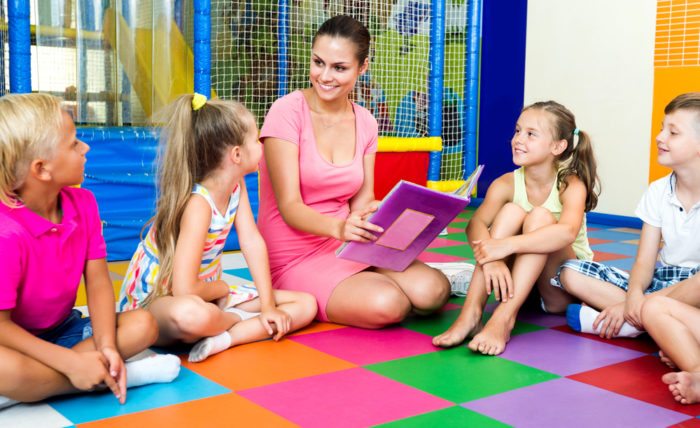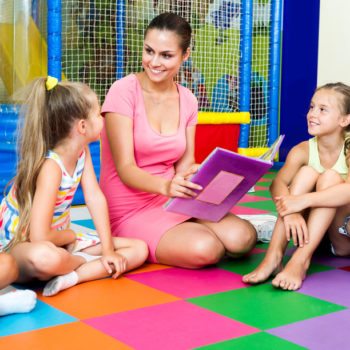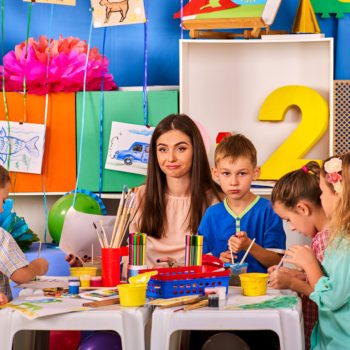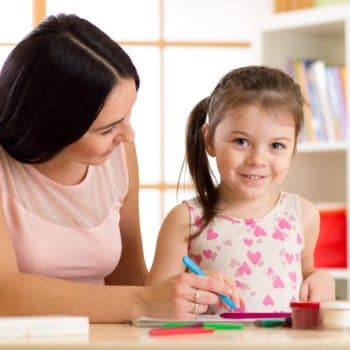Why We Love It
-
$57,730Potential Avg. Salary*
-
Growing DemandJob Outlook
* Salary & growth data is based on the recent Bureau of Labor and Statistics data published at https://www.bls.gov/oes/current/oes252021.htm for 25-2021 Elementary school teachers, except special education 11/2021. Based on national data, not school-specific information. Conditions in your area may vary.
With a bachelor of science in early childhood education (sometimes referred to as “elementary education”), you’ll gain the skills and education needed to teach and care for young children—from newborns to preschoolers.
This degree will qualify you to work and teach in daycares, preschools, and Head Start programs across the U.S. With experience, you may even be able to move into management or director positions later in your career.
What is a Degree in Early Childhood Education?
A bachelor of science in elementary or early childhood education prepares you for working in daycares, preschools, elementary schools, and Head Start programs. You’ll learn how to teach and care for children who haven’t yet reached school age, from newborns to pre-kindergarteners.
You’ll also learn how to develop a curriculum that enhances learning based on age, how to identify behavioral and learning disabilities, and how to work with parents to extend learning from the classroom to home.
Graduates from early childhood education programs usually find work in daycares, preschools, and elementary schools as teachers, caregivers, and administrators. After earning experience as a daycare worker, preschool teacher, or Head Start teacher, you may qualify to move into managerial roles like daycare administrator or director.
Additionally, if you want to teach elementary school later in your career, you may be able to get licensed by completing a one-year transition to teaching program.
Recommended Schools
What Courses Would I Take For a Major in Early Childhood Education?
- Introduction to the Education Profession
- Educational Psychology
- Mathematics Concepts for Teachers
- Science Concepts for Teachers
- Social Studies Concepts for Teachers
- Literacy Methods
- Introduction to Child Development
- Families, Communities, and Schools
What Jobs Can You Get with a Degree in Early Childhood Education?
In recent years, it’s become more common for all adults in a household to work, resulting in an increased demand for organizations that provide early childhood care. As such, the future looks bright for individuals with a bachelor of science in early childhood education.
There should be a consistent demand for daycare workers and preschool teachers in the coming decades. Additionally, since early education is mandated by law, there’s always demand for passionate and effective teachers in public schools.
How Long does it take?
A bachelors in Early Childhood Education will have a typical length of 4 years in a full time schedule. That said, there are many ways to speed up the timeframe by either taking more units via online coursework, community college, or taking free classes at OnlineDegree.com that could transfer to universities in the US.
Online Early Childhood Education Degree
Early childhood education is not very common choice among college students however, several universities offer online degree programs in this field. The content of the available programs may vary significantly with some programs requiring around 40 credit hours while other may reach 120 credit hours.
You may also choose to study a master’s degree if you already have a bachelor degree in education.
What Can You Do With an Early Childhood Education Degree?
Early childhood education, which is also known as nursery education, is a specialization of education that focuses on children from birth to the age of 8 years.
It has grown as an important field as municipal, state and federal authorities provide funding for preschool and pre-K. There are several theories proposed for teaching at this particular age including Vygotsky’s socio-cultural, Piaget’s constructivist, and Kolb’s experiential learning theories.
During this age, the curriculum should be delivered in the form of activities that involve physical, cognitive, and social development. Working with children at this early age is certainly exciting and enjoyable but it can also get stressful and challenging in some instances.
What does an early childhood education student learn?
Teaching young children requires understanding their abilities, development, behavior, and psychology. Teachers should know how to deal with the students, how to respond to their needs, and how to deliver a curriculum to them. The following list shows the courses that are commonly offered in early childhood education programs:
- Introduction to early childhood education: this course introduces the principles of this type of education and the differences compared to education to older students.
- Language development in early childhood: among the challenges in education for young students is that their language is not mature. The teacher needs to use different methods for the delivery of the content in addition to helping the students develop their language.
- Beginning literacy: this course introduces the methods used to teach the students the concept and techniques of writing and reading which includes knowing the letters, words and phrases.
- Assessment and Evaluation in Early Childhood Education: this is a challenging part of education to these young students as it is not possible to evaluate them using traditional exams used with older students.
- Language Arts and Reading for Early Childhood: arts can be considered the main tool used in early childhood educations including the use of drawings, songs or games. Teachers also use storytelling but the content must use simple language of short phrases that can cope with the language development of the students.
- Science for Young Children: This course introduces the scientific basics that should be introduced to the students and how these basics can be taught.
- Child Health and Safety: a teacher for the children at this age is not only responsible for teaching them but he/she is also responsible for the health and safety of the children inside the class.
Now I have the early childhood education degree…where can I work after graduating?
Early childhood education is a favorable career for people who are passionate about children. You will work with children in the most important part of their development. There are various positions that you may consider in this career. It is also common to shift between different positions during your career life.
- Preschool or elementary school teacher: this is considered the entry-level job in this career. In the beginning, you may work as an assistant teacher under the close supervision of a mentor.
- Childcare center director: this position is responsible for the day-to-day management of daycare, preschool, and childcare center. Administrative tasks include record keeping, career counseling, and evaluation of staff.
- Home-based service provider: you may choose to work as a freelancer educator who provides home-based services. You may help students with educational difficulties or students in home-schooling. In these settings, you will need to plan more activities for the students to compensate for their interaction at school with their fellows.
- Family support specialist: you will provide support to families facing special conditions or crises such as a divorce, devastating health conditions, or financial stress.
- Consultant: if you have enough experience, you may choose to provide consultancy to schools or childcare institutes to establish their curriculum or support children with special needs.
- Researcher: early childhood education is a field of exciting research where you can develop new educational methods that fulfill the rapid changes in the world and make use of new technologies.
Should I choose an early childhood education degree?
If you are passionate about children and you have an interest in education and leaving an impact on children during their early stages, then you should consider starting your career in this field. It is an exciting and enjoyable career.
You will also develop several skills that are essential for teachers:
- Passion and enthusiasm for early childhood education
- Patience
- Sense of humor, creativity, and ability to develop games and enjoyable teaching methods
- Communication skills: you will need exceptional skills to effectively communicate with the students and their families.
- Understanding diversity
Recommended Schools
Best Jobs for Early Childhood Education Degrees
Individuals with a bachelor of science in early childhood education move into careers where they care for and educate children that have not yet reached school age.
While many work in daycares and preschools, working as an au pair, babysitter or nanny is common as well. Many move on to become directors or administrators at daycares, and some even go own to own and operate their own daycares.
How to save time and money
Our mission is to help you to avoid paying full price for college. We want your Early Childhood Education degree to be affordable and accessible. Here’s how you could save:
Create Your Free SmartPlan

There are many ways to make college affordable and accessible.
That’s why we created a helpful tool called SmartPlan.
It’s free, and helps you find potential ways to save and tons of information about each school you’re considering
Think of it as your “college blueprint”, to help you instantly craft a path to your degree:
- Which Colleges Match Your Needs
- Ways You Could Save Time & Money
- Free Courses You Could Take for Credit
- Valuable Data and Insights on Each College
- Detailed Steps You Should Take!
See what’s possible for you and generate a free plan within just a few minutes
Create My SmartPlanGet a Certificate in Early Childhood Education First
A degree won’t guarantee employment after college. Most employers look for individuals with both a degree and professional experience. By earning a certificate in early childhood education first, you will be able to find entry-level work in daycares and preschools.
This will allow you to gain experience while you pursue a bachelor’s degree, and your credits from the certificate program may transfer to reduce the number of classes you need to take to earn a bachelor’s degree.
You Might also be Interested in
Many visitors who look for a degree in Early Childhood Education are also interested in the following degrees.












